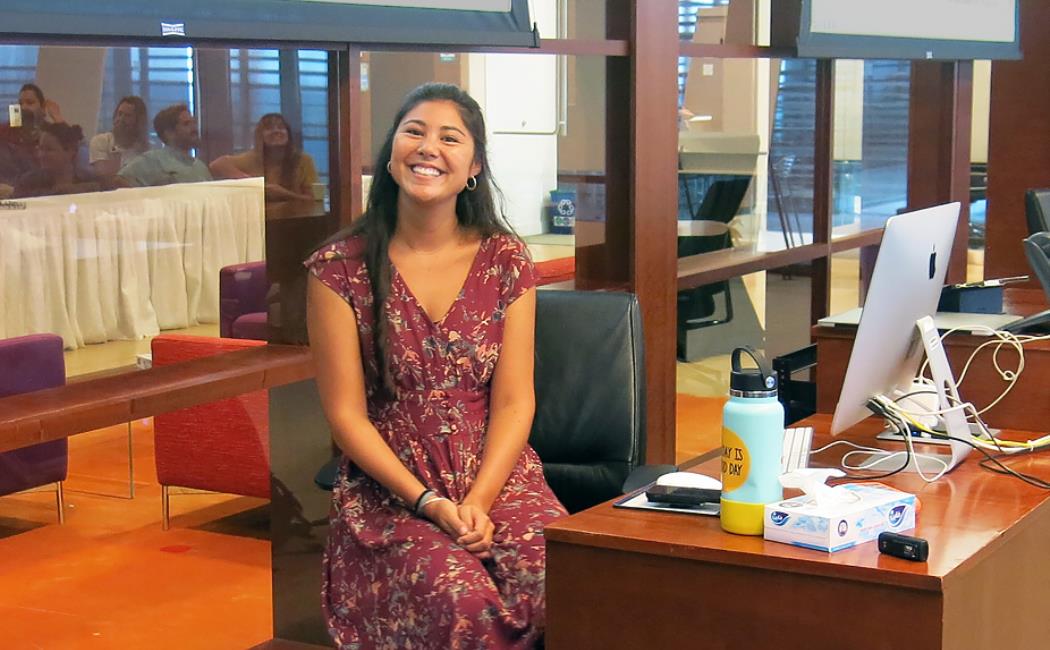


“I’ve always lived near the sea,” shares Lyndsey Tanabe, who has graduated from KAUST with a Ph.D. in marine science. Born in Hawaii, Tanabe moved from the middle of the Pacific to the edge of the Atlantic at the age of five and spent much of her childhood in Maine. As part of her undergraduate studies at Dickinson College in Pennsylvania, she studied abroad in Turks and Caicos, before returning home to Hawaii. Soon, the inexorable lure of the Red Sea prompted her to apply for a master’s degree at KAUST which of course led to her Ph.D.
Tanabe’s research was focused on marine turtles, two species of which can be found quite easily, just off the shores of KAUST. “The first is the endangered green turtle,” she says, “and the second is the critically endangered hawskbill turtle.” There is much to be learned about these remarkable creatures, but Tanabe was “particularly interested in understanding their movement and identifying their critical habitats.” To gather data, nesting female turtles were fitted with satellite tags which provided location and depth information, allowing Tanabe to identify their foraging grounds, which, she explains, are “really important habitats to protect.”
Finding answers to questions about how the world works has been the driving force through Tanabe’s academic career, and she knows that a huge part of scientific discovery is determining the right questions to ask. “My job right now is to come up with questions,” she says, “and think of creative solutions in order to answer those questions.” When she first arrived at KAUST, Tanabe’s intention was to study whale sharks, but “interestingly, they didn’t aggregate that year.” This forced a relatively quick rethink of her research plans, and she found that “nobody at KAUST had yet studied sea turtles.” The work she has done in the intervening years has filled a massive data gap and provided vital information about these endangered species.
Her life ashore at KAUST has been every bit as adventurous as her research at sea, and Tanabe has made “lifelong friends” from all over the world through her work and social activities. For three years, she worked as a Resident Assistant (RA), which was “a great way to meet students who weren’t in marine science.” She also became a member of the Hula Club, which despite being from Hawaii she had never tried before. This group of ten have danced together for five years, and Tanabe was delighted when they organized a lūʻau, “to celebrate all the dances that [they’ve] done together and really put an end to [her] experience as a Ph.D. student.”
While being near the sea is undoubtedly Tanabe’s favorite thing about KAUST, she has tried to see as much of The Kingdom as possible. “I really love adventure and exploring,” she says, “and I've been able to go camping and hiking all over Saudi Arabia.” The treasures she has found throughout the country, including picturesque waterfalls and wadis, have opened her eyes to a place that was quite mysterious to her when she arrived; “it’s been a pretty pleasant experience for me, getting to enjoy the unexpected surprises that Saudi has to offer.”
As she joins the ever-expanding community of KAUST alumni, Tanabe is grateful to all who have supported her through her time as a student, in particular her supervisor, Professor Michael Berumen, Director of KAUST’s Red Sea Research Center. As a fellow American, Berumen was “really excited” for Tanabe to come to KAUST, and she has had “a great time working with him for the last five years.” Of course, the work was not without its challenges, but Tanabe always made sure to find the positive in every situation; “my Ph.D. experience has been a roller coaster,” she shares, “especially through covid, but I definitely have learned to persevere and make it through and I'm really proud of myself for finishing.”
Looking to the future, Tanabe will continue her work in marine conservation, and she remains open-minded about how exactly she will make her contribution. Whether it’s teaching, or advising on government policymaking or something in-between, she knows she will always be committed to her passion. “I obviously love the ocean,” she affirms, “and I really want a career where I can protect what I love.” The work she has done at KAUST places her firmly on that path, and as the first person ever to tag a hawksbill turtle in the Red Sea she will undoubtedly continue seeking the answers to questions no-one has yet thought to ask.